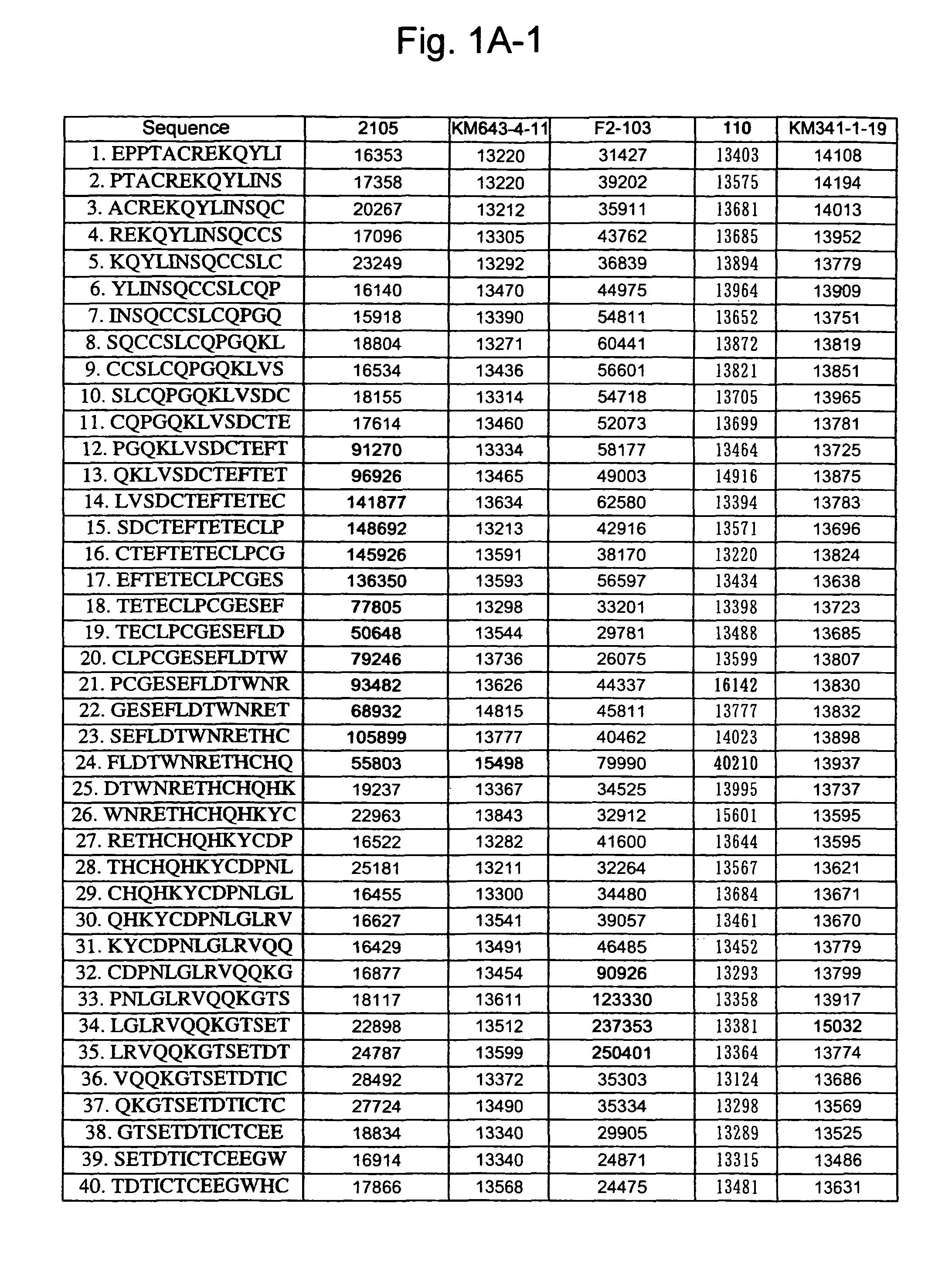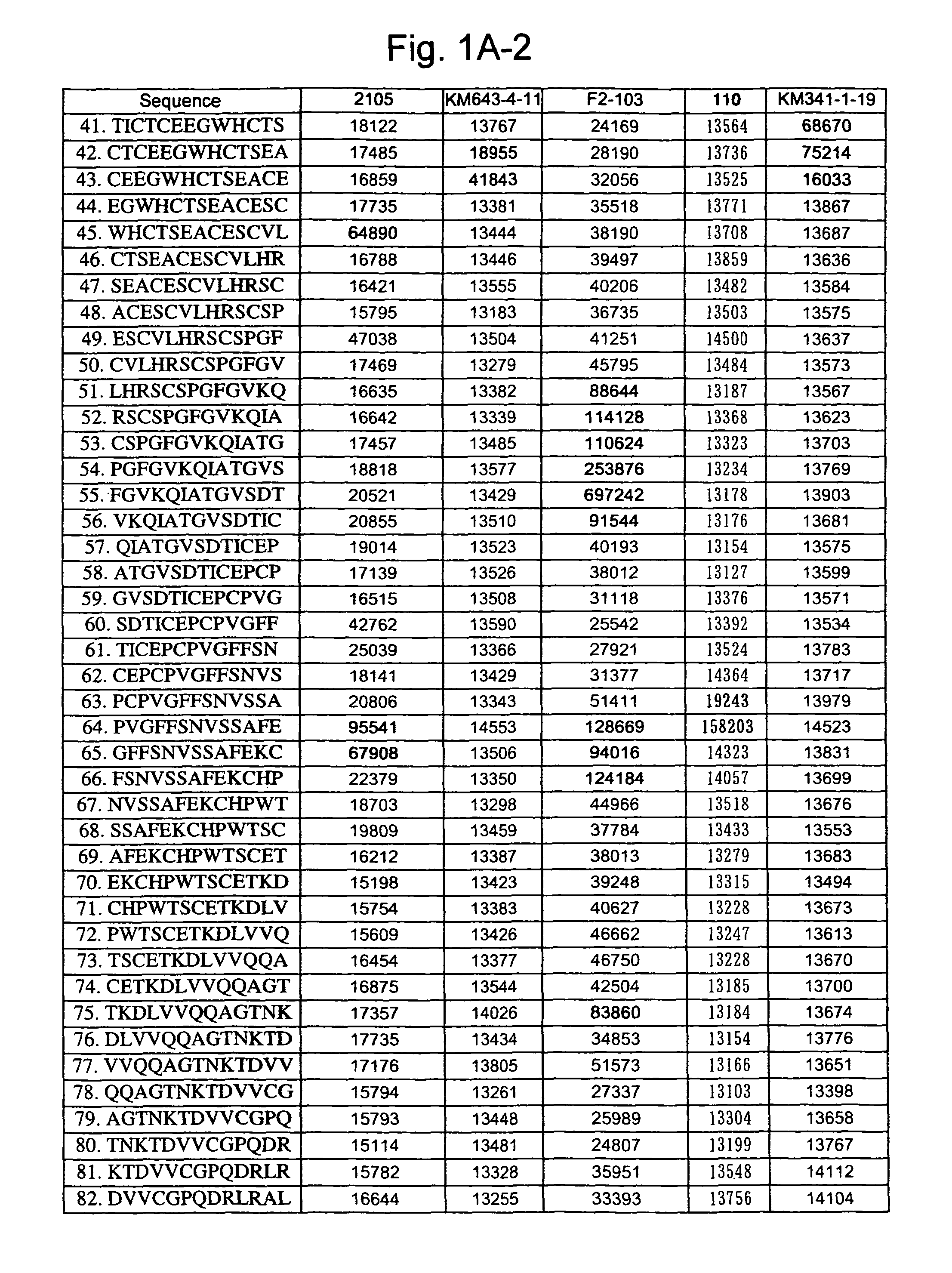Method of treating transplant rejection with an anti-CD40 antibody
a technology of anti-cd40 antibody and transplant rejection, which is applied in the field of anti-cd40 antibody, can solve the problems of unrecognized anti-bodies, and achieve the effect of high-quality treatment effect against diseases
- Summary
- Abstract
- Description
- Claims
- Application Information
AI Technical Summary
Benefits of technology
Problems solved by technology
Method used
Image
Examples
example 1
Expression and Purification of Antibody and Antigen Proteins
[0259]A vector plasmid containing a variable region of an antibody was transfected into CHO cells (ATCC), and antibody-expressing cells were selected by G418 to prepare a stable expression cell line.
[0260]A mutant antigen was expressed by transiently introducing a vector into HEK cells (ATCC).
[0261]An anti-CD40 antibody was purified from the above culture supernatant by the following method. The culture supernatant containing an anti-CD40 antibody was affinity purified in a Hyper D® Protein A column (manufactured by NGK Insulators, Ltd.) or in case of mouse IgG1 purification, a Protein G column (Amersham Pharmacia Biotech) according to the attached instruction using PBS(−) as an adsorption buffer and a 0.1 M sodium citrate buffer (pH 3) as an elution buffer. The eluted fraction was adjusted to about pH 7.2 by addition of a 1 M Tris-HCI (pH 8.0) or Na2HPO4 solution. The prepared antibody solution was substituted with PBS(−) ...
example 2
Determination of epitopes
[0262]A 13-mer peptide covering amino acid 175 (SEQ ID NO: 1) in an extracellular region of CD40 was shifted by two amino acids each to synthesize 82 peptides in total (SEQ ID NOS: 49 to 130) as spots from the C-terminal on a cellulose membrane and acetylate the N-terminal thereof (Jerini AG, Germany). The reaction thereafter was carried out based on a conventional Western analysis (see Reineke, U. et al. (2001), “Epitope mapping with synthetic peptides prepared by SPOT synthesis.” Antibody Engineering (Springer Lab Manual) Eds.: Kontermann / Dubel, 433-459, for example). In the analysis, coloring intensity of each spot was quantified using Lumilmager™ (Boehringer-Mannheim Corp.) (FIG. 1A-1, 1A-2, 1B-1 and B-2).
[0263]The results confirmed that an 4D11 antibody strongly recognizes the 20th to 24th and 41st peptides, a 2105 antibody strongly recognizes the 12th to 23rd and 64th peptides, a KM341-1-19 antibody strongly recognizes the 41st and 42nd peptides, KM643...
example 3
Binding Activity of Anti-CD40 Agonistic Antibody to Ramos Cells
[0265]A Ramos cell line was suspended in a PBS staining buffer (SB) containing 0.1% NaN3 and 2% FCS at a concentration of 2×106 / ml. The cell suspension (100 μI / well) was dispensed to a 96-well round-bottom plate (manufactured by Becton, Dickinson and Company). Each hybridoma culture supernatant (50 μl) was added, and incubated at an ice temperature for 30 minutes. A human IgG1 antibody to human serum albumin as a negative control was adjusted to a concentration of 2 μg / ml in a hybridoma culture medium, added in an amount of 50 μl, and then incubated at an ice temperature for 15 minutes. After washing the plate with SB, 50 μl of a 250-fold diluted R-PE fluorescently labeled anti-human antibody (manufactured by Southern Biotechnology Associates, Inc.) was added, and incubated at an ice temperature for 15 minutes. After washing the plate with SB twice, it was suspended in 300 to 500 μl of a FACS buffer, and fluorescence int...
PUM
| Property | Measurement | Unit |
|---|---|---|
| molecular weight | aaaaa | aaaaa |
| pH | aaaaa | aaaaa |
| pH | aaaaa | aaaaa |
Abstract
Description
Claims
Application Information
 Login to View More
Login to View More - R&D Engineer
- R&D Manager
- IP Professional
- Industry Leading Data Capabilities
- Powerful AI technology
- Patent DNA Extraction
Browse by: Latest US Patents, China's latest patents, Technical Efficacy Thesaurus, Application Domain, Technology Topic, Popular Technical Reports.
© 2024 PatSnap. All rights reserved.Legal|Privacy policy|Modern Slavery Act Transparency Statement|Sitemap|About US| Contact US: help@patsnap.com










